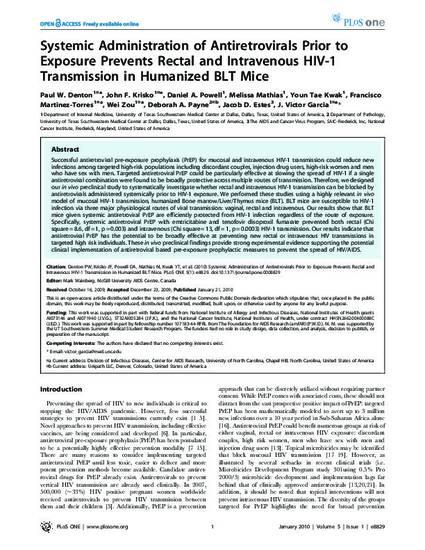
Successful antiretroviral pre-exposure prophylaxis (PrEP) for mucosal and intravenous HIV-1 transmission could reduce new infections among targeted high-risk populations including discordant couples, injection drug users, high-risk women and men who have sex with men. Targeted antiretroviral PrEP could be particularly effective at slowing the spread of HIV-1 if a single antiretroviral combination were found to be broadly protective across multiple routes of transmission. Therefore, we designed our in vivo preclinical study to systematically investigate whether rectal and intravenous HIV-1 transmission can be blocked by antiretrovirals administered systemically prior to HIV-1 exposure. We performed these studies using a highly relevant in vivo model of mucosal HIV-1 transmission, humanized Bone marrow/Liver/Thymus mice (BLT). BLT mice are susceptible to HIV-1 infection via three major physiological routes of viral transmission: vaginal, rectal and intravenous. Our results show that BLT mice given systemic antiretroviral PrEP are efficiently protected from HIV-1 infection regardless of the route of exposure. Specifically, systemic antiretroviral PrEP with emtricitabine and tenofovir disoproxil fumarate prevented both rectal (Chi square = 8.6, df = 1, p = 0.003) and intravenous (Chi square = 13, df= 1, p = 0.0003) HIV-1 transmission. Our results indicate that antiretroviral PrEP has the potential to be broadly effective at preventing new rectal or intravenous HIV transmissions in targeted high risk individuals. These in vivo preclinical findings provide strong experimental evidence supporting the potential clinical implementation of antiretroviral based pre-exposure prophylactic measures to prevent the spread of HIV/AIDS.

This is an open-access article distributed under the terms of the Creative Commons Public Domain declaration which stipulates that, once placed in the public domain, this work may be freely reproduced, distributed, transmitted, modified, built upon, or otherwise used by anyone for any lawful purpose.